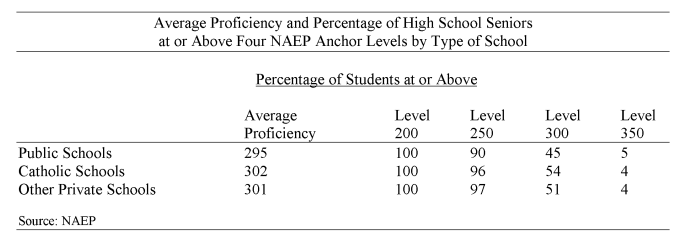Tell a story once or twice and people might be skeptical about it. Tell in 10 or 20 or 100 times, and most people will accept it as truth. For years, we've heard that Catholic and other private schools do a far better job of educating their students than public schools. Catholic schools have gotten especially good press because, we've been told, they take kids just like the ones in public schools and get them to achieve at much higher levels. This idea is so commonly accepted that the Bush administration has cited it to justify using public money to educate students in private schools.
Now, I've never believed that private and public school students are the same kids; but, like everybody else, I bought the idea that private schools are getting better results. Then, at a recent briefing about the scores on a National Assessment of Educational Progress (NAEP) mathematics examination, my eyes were opened. Everybody was talking about the poor student performance at all levels -- and they certainly were right. But these results, though they were disastrous, were more of what we've been seeing for a long time. However, as I looked at the inch-thick book reporting the scores, I noticed something I hadn't seen before -- the results for parochial and other private schools appeared alongside the public school results.
hey showed that in fourth and eighth grades, private school students did outperform students from public schools. But the bottom line is what kids know and are able to do when they go to college or look for a job. And I was surprised to see that there was very little difference between the scores of high school seniors in public and private schools.

Most seniors in public and private schools have mastered the basics, represented by levels 200 and 250. When it comes to level 300, students from Catholic and other private schools do slightly better than public school students. But if you consider that 300 represents the math that NAEP says kids are supposed to learn in seventh grade, the real story is that in both public and private schools, half our graduating seniors are still functioning at a seventh-grade level.
At the top achievement level of 350, which means a student knows some algebra and may be prepared to do college math, public school students surpass students from Catholic or other private schools (5 percent compared with 4 percent) though, again, this is nothing to brag about. In fact, it means that about 95 percent of our high school graduates -private as well as public- would be unable to get into college in any other industrialized country.
Had I been wrong in thinking that private school students were different from the kids who went to public school? Maybe that's why the scores were about the same? So I asked whether the NAEP assessments included data about student backgrounds. They did, and private school students turned out to be children who should give private schools just the advantage in performance that we've all heard about.
• In the sample of students tested by NAEP, about 50 percent more private school students had parents who were college graduates. If there is anything education research tells us, it is that higher education translates into a higher income, and both are strongly correlated with student achievement.
• Private school students take different -- and more demanding -- programs. For example, 81 percent of the private school seniors in the NAEP sample (in comparison with 56 percent of public school seniors) were in an academic track. And taking more academic courses (like having better educated parents) is strongly associated with higher achievement.
These and other differences between public and private school students in background and courses taken show why when you look only at the average scores, private school students sometimes outscore public school students. But when you compare the NAEP scores of public and private school students who have taken similar courses-if you compare apples with apples-their achievement is almost identical.
Might these NAEP scores be a fluke? In fact, there is plenty of evidence from elsewhere to back up what they tell us. I'll talk about some of it in later columns. In the meantime, there is one important thing to keep in mind.
Debunking the private school advantage that so many people take on faith is nothing to crow about. The fact is that both private and public education are doing a disastrously bad job. So if we are serious about our students' meeting world-class standards-or even being able to do seventh-grade math by the time they leave high school -- private school choice is not the answer. Instead, we'd better concentrate our energies on improving all our schools.
